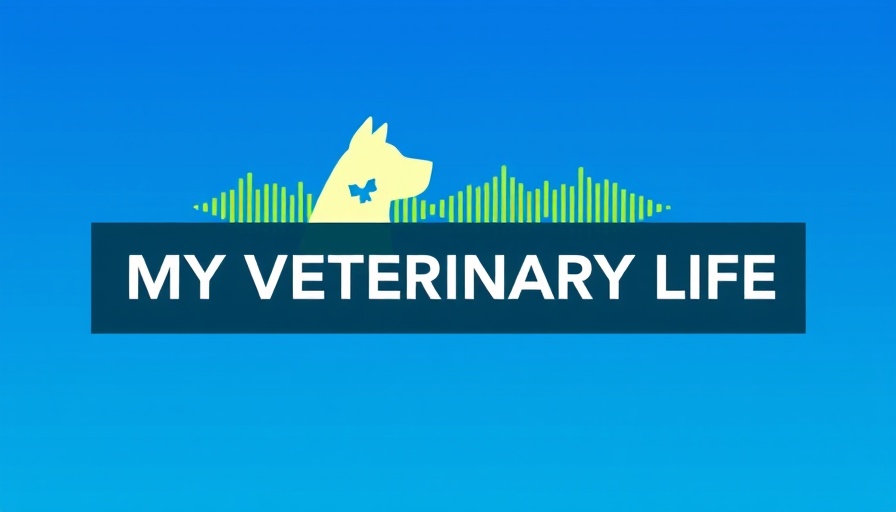
Understanding the Importance of Diversity in Veterinary Medicine
In recent years, the dialogue surrounding diversity and inclusion in veterinary medicine has intensified, bringing to light a vital aspect of the profession. The veterinary field, traditionally homogeneous, is gradually recognizing the necessity of more diverse representation. In a recent episode of the 'Diversity and Inclusion on Air' series featured in the My Veterinary Life podcast, prominent veterinarians discussed the importance of embracing diversity to better serve animals and their owners. Drs. Cara Williams and Tyra Davis shared their experiences, emphasizing that diversity is not merely a statistic but a means to improve healthcare outcomes for all pets and their families.
Breaking the Barriers: Personal Stories from the Field
The podcast brings personal narratives to the forefront, with veterinarians recounting their journeys through a system often fraught with challenges related to racial and gender biases. For instance, Dr. Tierra Price highlighted how her background shaped her perspective on pet care and the necessity of compassionate understanding in veterinary practice. These stories help illuminate the real-world implications of a lack of diversity, as clients often feel alienated in spaces where they do not see themselves represented. The insistence of Elena Blackwell that fostering an inclusive environment can improve patient outcomes echoes the sentiments shared by her colleagues. Without diverse practitioners, many animal families may not receive the empathy or understanding they require.
Paving the Way for Future Generations
Diversity in veterinary medicine is not just a matter of representation; it's about creating pathways for future professionals. Organizations like the AAVMC are working diligently to recruit underrepresented groups, recognizing that a varied workforce enhances the profession. This initiative not only combats the existing disparities but also aligns the veterinary community with the society it serves. By creating scholarships and outreach programs tailored to marginalized populations, the AAVMC is setting the groundwork for an inclusive future.
Connecting with the Community Through Veterinary Education
Education plays a pivotal role in transformation. The insights from the 'Diversity Matters' initiative underscore the importance of mentoring and inclusive educational practices. With the support of organizations such as the Multicultural Veterinary Medical Association (MCVMA), veterinary schools are encouraged to adopt curricula that highlight the significance of equity and diversity in healthcare settings. This foundational knowledge equips future veterinarians with the tools necessary to navigate a diverse client base successfully.
Challenges Faced by Veterinary Professionals
Despite the strides being made, challenges remain. The barriers that restrict entry into the profession for various demographics continue to be significant. Many aspiring veterinarians encounter systemic obstacles, from financial hurdles to cultural biases within academic environments. Tina Tran, DVM, discussed how these challenges manifest in the veterinary field, ultimately impacting the overall well-being of the profession. By addressing these educational gaps head-on, the industry can foster a compassionate and inclusive network that benefits everyone involved—pets, pet owners, and professionals alike.
The Way Forward: Embracing Change in Veterinary Practices
The Veterinary Podcast Crossover Series effectively stresses the need for action. It's one thing to acknowledge that diversity matters; it's another thing entirely to implement changes in practice. Veterinary hospitals and clinics across the nation are encouraged to foster environments where diverse voices can be heard, respected, and valued. This commitment can take many forms: from community outreach and educational programs to hiring practices that actively seek to elevate underrepresented individuals within the profession.
Conclusion: Taking Action to Support Diversity
As the veterinary profession continues to evolve, the call for greater diversity and inclusion becomes increasingly critical. Whether you are a pet owner, a veterinarian, or involved in the pet healthcare sector, your support for these initiatives can make a significant difference. Engage with local veterinary programs, advocate for diversity in hiring, and prioritize training that fosters an understanding of diverse pet ownership experiences. Together, these efforts can ensure that all pets have access to compassionate, culturally competent care.
Join the conversation about diversity in veterinary medicine and consider taking steps in your local communities to support these vital changes.
 Add Row
Add Row  Add
Add 


 Add Row
Add Row  Add
Add 

Write A Comment